We have a label / category on this blog for posts about "people we'd like to invite to morning tea". For this particular post, it's less about who we'd like to invite to morning tea and more about who we'd like to share a Styrofoam cup of Iraqi tea with...
We wanted to share with you the Enemy Kitchen project's latest incarnation as part of Chicago's Smart Museum’s exhibition “Feast: Radical Hospitality in Contemporary Art”. According to Michael Rakowitz's website:
"Enemy Kitchen is an ongoing project begun by Michael Rakowitz in 2004. Collaborating with his Iraqi-Jewish mother, he compiles Baghdadi recipes and teaches them to different public audiences".The website lists all the project's many great ways of reaching people, including contact with American veterans of the Iraq War. Veterans are playing a key note with Enemy Kitchen in 2012. Here's the story from Chicago's Time Out:
"The juxtaposition of veterans and Iraqi food—and the conversation that it could spark—is exactly what artist Michael Rakowitz was counting on when he began to assemble the players for the Enemy Kitchen food truck, which debuts as part of the Smart Museum’s upcoming show “Feast: Radical Hospitality in Contemporary Art,” but will roll on as an actual working food truck thereafter.
"One of Rakowitz’s key players is Aaron Hughes, an artist and Iraq War vet. Hughes will work the typical service positions on Enemy Kitchen, but he’ll also conduct a performance titled “Tea,” in which each evening at sunset he’ll unfurl an Iraqi prayer rug, fire up a hot plate and begin the time-consuming double-boiler method of traditional Iraqi tea service. When he’s done, he’ll hand passersby cardamom-scented black tea in Styrofoam cups adorned with hand-doodled arabesque flowers.
“In Guantanamo Bay, the only object detainees are allowed to have in their cell are Styrofoam cups for tea, so they draw all over them,” Hughes says. “They never write anything, they always just draw flowers.” Hughes was a soldier in the Illinois Army National Guard 1244th Transportation Company. He was stationed in Kuwait, and drove supply trucks in and out of Iraq daily. “We’d pull into these bases as the sun was setting, and the third-world nationals that are contracted to essentially be indentured servants to soldiers would roll out their prayer rugs, warm tea and offer it to us,” he remembers. “Every night, I would refuse.”
“They were from Pakistan or Bangladesh or other third [world] countries and it was ingrained in us that these individuals—we called them hajis just as we did the Iraqis—could not be trusted,” Hughes continues. “Everything was racialized in war.”
"Hughes returned to Chicago in 2006 and found a similar sentiment here, which prompted him to form the Chicago chapter of the Iraq Veterans Against the War. That same year, Rakowitz was leading a group of New York City high-school kids through an after-school program he dubbed Enemy Kitchen. In the utilitarian kitchen of Manhattan’s Hudson Community Guild Center, Rakowitz shared stories about his grandfather, who was exiled from Iraq in 1946; his mother, who lamented the lack of Iraqi restaurants in New York; and his grandmother, who still waxed poetic over their country’s prized dates. As he spoke, the students formed patties of ground lamb and bulgur for the Rakowitz family recipe for kubbe. Inevitably, talk turned to the war.
“A few sessions in, this Puerto Rican girl came in and said ‘I’m sick and tired of making this food. This food is nasty and they blow up our soldiers every day and they knocked down the Twin Towers,’ ” Rakowitz recalls. “And then this one kid Hashim, whose family is from the Caribbean, says, ‘No, the Iraqis didn’t knock down the Twin Towers, it was bin Laden,’ while this other kid, whose family is from Mexico, goes, ‘It wasn’t bin Laden, it was our own government.’ So all of a sudden you have this snapshot of everything, from the misinformation out there and mainstream beliefs to conspiracy theory. I really loved them being able to express this, because I didn’t want to do Enemy Kitchen with an art audience standing around saying ‘Oh, I feel like you’…there’s no friction, no dialogue fueled by a certain sense of opposition.”
"Now living in Chicago, teaching at Northwestern’s Department of Art Theory & Practice, Rakowitz has resurrected Enemy Kitchen as a repurposed ’60s-era ice-cream truck. And while that truck will be staffed by veterans of the Iraq War, the food will be cooked by Jawher Shaer and his two sons, who own and run Milo’s Pita Place in Rogers Park....
"[The] food truck dubbed Enemy Kitchen, serving exclusively Iraqi food and staffed by Iraq War veterans such as Hughes, Alejandro Villatoro, Ash Woolson, Greg Broseus and Crystal Colon, who are very publicly bringing issues to the table. “We were born in Iraq, we do Iraqi food, and we have a lot of respect for the veterans who fought there, so we are happy to be involved in this project, which we find very interesting,” Milad says. “For instance, Mike [Rakowitz] says Aaron [Hughes] makes great Iraqi tea and he will do this at the truck, which to us is surprising that he would have any interest. For us, tea is mandatory, in every house, after every meal. It is our custom. Now, to have an American soldier make us Iraqi tea? I’m dying to have some.”We wish we were there to share some Iraqi tea, too :) Sadly, most Archive volunteer staff are too far away, but we do have Archive Friends in Chicago who we hope will take note of this post and visit both the exhibition and Enemy Kitchen. Please, send us some photos!
The Smart Museum writes of “Feast: Radical Hospitality in Contemporary Art”:
"Since the 1930s, numerous artists have used the simple act of sharing food and drink to advance aesthetic goals and to foster critical engagement with the culture of their moment. These artist-orchestrated meals can offer a radical form of hospitality that punctures everyday experience, using the meal as a means to shift perceptions and spark encounters that aren't always possible in a fast-moving and segmented society.
"Feast surveys this practice for the first time, presenting the work of more than thirty artists and artist groups who have transformed the shared meal into a compelling artistic medium. The exhibition examines the history of the artist-orchestrated meal, assessing its roots in early-twentieth century European avant-garde art, its development over the past decades within Western art, and its current global ubiquity. Through a presentation within the Smart Museum and new commissions in public spaces, the exhibition will introduce new artists and contextualize their work in relation to other influential artists, from the Italian Futurists and Gordon Matta-Clark to Marina Abramović and Rirkrit Tiravanija. Feast addresses the radical hospitality embodied by these artists and the social, commercial, and political structures that surround the experience of eating together."The exhibition runs for another two weeks (it will tour in 2012 and 2014). According to Time Out:
"Enemy Kitchen will debut at 7pm on Wednesday 15 at the Smart Museum of Art (5550 S Greenwood Ave, 773-702-0200) as part of “Feast: Radical Hospitality in Contemporary Art.” Beyond that it will operate on Sundays and Mondays throughout Chicago. Check Twitter (@enemykitchen) for locations and times"Want to know more?





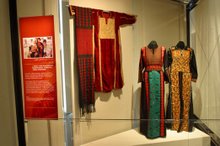






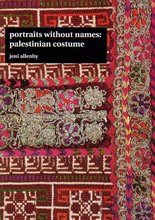
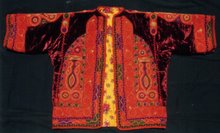
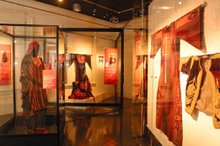


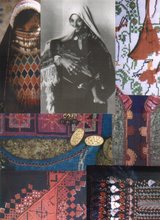













No comments:
Post a Comment